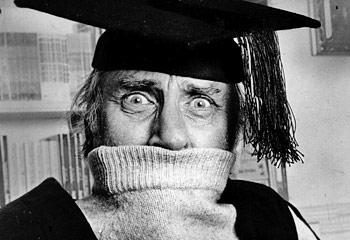TV & VIDEO









'Knock knock.' 'Who's there?' 'Somebody else!'
Spike Milligan was one of the very few comedians to deserve the title 'comic genius'. His brain seemed to have been wired up to life in a different way to the rest of us; who else could have come up with such a charming, childlike yet almost existential line for a simple 'knock knock' joke? His childlikeness was, I think, his most endearing quality. When he told a joke you could see he was actually laughing about it himself (not just pretending to laugh as part of his 'act' like some comedians do) and a big part of our enjoyment of him was this infectious, unselfconscious enjoyment of his own material. There was nothing contrived or clever-clever about his comedy; it was just pure unadulterated play (how apposite that word is if you take it to mean 'unspoilt by adult logic'). Just as children have the greatest instinctive wisdom, so this form of childlike humour is actually comedy in its highest form - far beyond the more cerebral reaches of wit or satire.
When I'm illustrating a picture book I get the chance to listen to the radio while I'm working (obviously this is impossible when I'm writing) and I always listen out for when there are repeats of The Goon Show. Though it's over fifty years old, there are always a few laugh out loud moments which you can tell have come from the pen of the godfather of alternative comedy. Moments such as this:
Seagoon: We're here to disconnect your phone.
Red Bladder: But I haven't got one.
Bloodnot: Don't worry, we've brought one with us.
If you can hear the brilliant characterisation of Spike and Peter Sellers in your head then it's even funnier. How about this one:
Eccles: Quick, hide behind this pane of glass!
Seagoon: But you can see through it!
Eccles: Not if you close your eyes!
Seagoon: You're right!
It seemed that Spike Milligan's joyful and childlike view on the world came at a price; he suffered from what they now called bi-polar disorder. If you look at his face alongside smiles of delight at the ridiculousness of life you can see the suffering in his eyes. Here's a joke with a serious subtext to it:
Listen, someone's screaming in agony - fortunately I speak it fluently.
I remember as a boy watching Milligan's TV show 'Q' with a whole range of reactions - to see adults behaving in such playful, childlike ways in these surreal sketches was shocking, slightly unsettling and also liberating. My two main memories from that series are of the 'smallest police station in Britain' sketch (in which we see a small wooden box, a hand reaches up to open a door on it revealing Spike's face crammed into it with just about enough room for a policeman's helmet. This fact that this hilarious image has stuck with me for over forty years shows just how memorably surreal Spike Milligan's comedy was.
He mixed physical gags like this with lines of dialogue which made us laugh whilst simultaneously challenging the whole 'world' created by the show's format. Sketch shows inevitably face the problem of how to finish a sketch and round it off with a satisfying punch line. Apparently Spike found this pressure a creative straightjacket, so instead of being constrained by the accepted 'rules' of how comedy is done, he broke the rules and in so doing deconstructed the whole sketch show form. This was shown most brilliantly (and disturbingly) at the end of one sketch when the characters who had taken part just stopped acting - there followed an awkward gap where the writing had 'run out'. The characters then stared at the camera (at us the viewer) and came clean about this awkward impasse by all as one saying, in a Spike-like voice; 'What are we going to do now?' Then, all together, they took another step forward and repeated the line and this went on and on until they were right up close to the camera.
This groundbreaking show was never given the respect it deserved by the BBC and unlike most other comedies wasn't ever repeated. It was almost as if the 'powers that be' had deemed it too dangerous, too raw for the British public. It took the Monty Python team to repackage it (and I use the term carefully) a few years later and make it slightly more commercial before such 'dangerous' comedy could find its place in the nation's living rooms.
Spike Milligan's had an in built rebelliousness and disregard for authority - developed no doubt, during his experience as a soldier in the second world war (How long was I in the Army? Five foot seven!').This irreverence was demonstrated most succinctly and hilariously at a comedy awards show in London in the nineties. By now a frail, white bearded old man he was being given a lifetime achievement award and it was presented with a note of appreciation from none other than Prince Charles. The ceremony's host started to read out this gushing appreciation from England's king-in-waiting and was soon interrupted by Spike Milligan himself saying, with a smirk, 'the grovelling bastard!' The shock in the room (and I'm sure the nation's living rooms) was seismic. You can't say that about our future king, can you? Well Spike could and he did. The lovely thing is that, as a Spike fan, Prince Charles would have got the joke and would be laughing at the outrageousness of the situation as much as the rest of us did.
It's wonderful how the best comedy can bring people together and break down boundaries. If someone laughs at what makes you laugh you instantly have a connections with them; if this story makes you laugh then you instantly have a connection with me.
There's a sad and surreal footnote to this theme of Spike's brilliant and irreverent humour coming up against authority; he famously requested that the legend "I told you I was sick' be written on his headstone. The church (St Thomas' in Winchelsea, East Sussex, England ) would not permit the phrase to be used - however, they did allow the sentiment expressed in Irish! Even in death the powers that be censored his final one liner.
I will finish this tribute with another one of Spike Milligan's brilliant, almost philosophical twists of logic. He was musing, apparently quite seriously, about acquisitiveness saying, 'Man wants to have it all.' Then he thought for a moment and said, 'but man can't have it all; I mean, where would he put it?'
Spike Milligan was unique; like the man behind the door in the knock knock joke, he truly was 'somebody else'.
NEW ON THE SITE
HAVE YOU SEEN?







